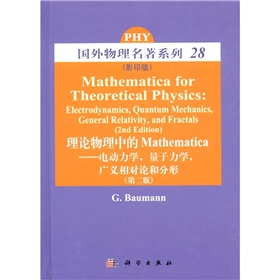理论物理中的Mathematica:电动力学,量子力学,广义相对论和分形 电子书下载 PDF下载

内容简介
《理论物理中的Mathematica:电动力学,量子力学,广义相对论和分形(第2版)(影印版)》主要介绍了Classical Mechanics and Nonlinear Dynamics Class-tested textbook that shows readers how to solve physical problems and deal with their underlying theoretical concepts while using Mathematica~ to derive numeric and symbolic solutions. Delivers dozens of fully interactive examples for learning and implementation, constants and formulae can readily be altered and adapted for the user's purposes. New edition offers enlarged two-volume format suitable to courses in mechanics and electrodynamics, while offering dozens of new examples and a more rewarding interactive learning enwironment.
·查看全部>>
目录
Volume 1
Preface
Introduction
1.1 Basics
1.1.1 Structure of Mathematica
1.1.2 Interactive Use of Mathematica
1.1.3 Symbolic Calculations
1.1.4 Numerical Calculations
1.1.5 Graphics
1.1.6 Programming
Classical Mechanics
2.1 Introduction
2.2 Mathematical Tools
2.2.1 Introduction
2.2.2 Coordinates
2.2.3 Coordinate Transformations and Matrices
2.2.4 Scalars
2.2.5 Vectors
2.2.6 Tensors
2.2.7 Vector Products
2.2.8 Derivatives
2.2.9 Integrals
2.2.10 Exercises
Kinematics
2.3.1 Introduction
2.3.2 Velocity
2.3.3 Acceleration
2.3.4 Kinematic Examples
2.3.5 Exercises
Newtonian Mechanics
2.4.1 Introduction
2.4.2 Frame of Reference
2.4.3 Time
2.4.4 Mass
2.4.5 Newton's Laws
2.4.6 Forces in Nature
2.4.7 Conservation Laws
2.4.8 Application of Newton's Second Law
2.4.9 Exercises
2.4.10 Packages and Programs
Central Forces
2.5.1 Introduction
2.5.2 Kepler's Laws
2.5.3 Central Field Motion
2.5.4 Two-Particle Collisons and Scattering
2.5.5 Exercises
2.5.6 Packages and Programs
Calculus of Variations
2.6.1 Introduction
2.6.2 The Problem of Variations
2.6.3 Euler's Equation
2.6.4 Euler Operator
2.6.5 Algorithm Used in the Calculus of Variations
2.6.6 Euler Operator for q Dependent Variables
2.6.7 Euler Operator for q + p Dimensions
2.6.8 Variations with Constraints
2.6.9 Exercises
2.6.10 Packages and Programs
Lagrange Dynamics
2.7.1 Introduction
2.7.2 Hamilton's Principle Hisorical Remarks
……
Volume Ⅱ
Preface
Introduction
1.1 Basics
1.1.1 Structure of Mathematica
1.1.2 Interactive Use of Mathematica
1.1.3 Symbolic Calculations
1.1.4 Numerical Calculations
1.1.5 Graphics
1.1.6 Programming
Classical Mechanics
2.1 Introduction
2.2 Mathematical Tools
2.2.1 Introduction
2.2.2 Coordinates
2.2.3 Coordinate Transformations and Matrices
2.2.4 Scalars
2.2.5 Vectors
2.2.6 Tensors
2.2.7 Vector Products
2.2.8 Derivatives
2.2.9 Integrals
2.2.10 Exercises
Kinematics
2.3.1 Introduction
2.3.2 Velocity
2.3.3 Acceleration
2.3.4 Kinematic Examples
2.3.5 Exercises
Newtonian Mechanics
2.4.1 Introduction
2.4.2 Frame of Reference
2.4.3 Time
2.4.4 Mass
2.4.5 Newton's Laws
2.4.6 Forces in Nature
2.4.7 Conservation Laws
2.4.8 Application of Newton's Second Law
2.4.9 Exercises
2.4.10 Packages and Programs
Central Forces
2.5.1 Introduction
2.5.2 Kepler's Laws
2.5.3 Central Field Motion
2.5.4 Two-Particle Collisons and Scattering
2.5.5 Exercises
2.5.6 Packages and Programs
Calculus of Variations
2.6.1 Introduction
2.6.2 The Problem of Variations
2.6.3 Euler's Equation
2.6.4 Euler Operator
2.6.5 Algorithm Used in the Calculus of Variations
2.6.6 Euler Operator for q Dependent Variables
2.6.7 Euler Operator for q + p Dimensions
2.6.8 Variations with Constraints
2.6.9 Exercises
2.6.10 Packages and Programs
Lagrange Dynamics
2.7.1 Introduction
2.7.2 Hamilton's Principle Hisorical Remarks
……
Volume Ⅱ
同类热门电子书下载更多
Copyright © 2025 by topbester.com.
All Rights Reserved.
沪ICP备14027842号-1
All Rights Reserved.
沪ICP备14027842号-1